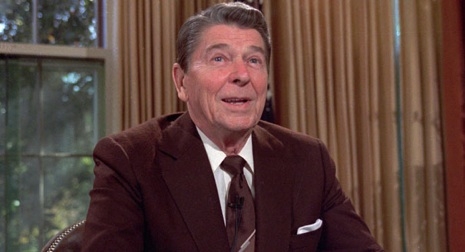
More stories about ignorance and food stamps.
2/27/82 The Congressional Budget Office finds that taxpayers earning under $10,000 lost an average $240 from last year’s tax cuts, while those earning over $80,000 gained an average of $15,130.
3/1/82 Sen. Bob Packwood (R‑OR) reveals that President Reagan frequently offers up transparently fictional anecdotes as if they were real. “We’ve got a $120 billion deficit coming,” says Packwood, “and the President says, ‘You know, a young man, went into a grocery store and he had an orange in one hand and a bottle of vodka in the other, and he paid for the orange with food stamps and he took the change and paid for the vodka. That’s what’s wrong.’ And we just shake our heads.”
3/1/82 In a speech to the Civil Defense Association, Ed Meese describes nuclear war as “something that may not be desirable.”
3/24/82 Agriculture official Mary C. Jarratt tells Congress her department has been unable to document President Reagan’s horror stories of food stamp abuse, pointing out that the change from a food stamp purchase is limited to 99 cents. “It’s not possible to buy a bottle of vodka with 99 cents,” she says. Deputy White House press secretary Peter Roussel says Reagan wouldn’t tell these stories “unless he thought they were accurate.”
4/15/82 Citing a favorite example of British jurisprudence, President Reagan says, “England was always very proud of the fact that the English police did not have to carry guns ... In England, if a criminal carried a gun, even though he didn’t use it, he was not tried for burglary or theft or whatever he was doing. He was tried for first‑degree murder and hung if he was found guilty.” White House spokesman Larry Speakes, on being informed that this fable is totally untrue, responds, “Well, it’s a good story, though. It made the point, didn’t it?”
4/30/82 President Reagan describes the Falkland Islands war as a “dispute over the sovereignty of that little ice‑cold bunch of land down there.”
5/10/82 Taking questions from students at a Chicago high school, President Reagan explains why his revised tax exemption policy could not possibly have been intended to benefit segregated schools. “I didn’t know there were any,” he says. “Maybe I should have, but I didn’t.”
5/21/82 Discussing Soviet weaponry at a National Security Council meeting, President Reagan asks CIA deputy director Bobby Inman, “Isn’t the SS‑19 their biggest missile?” No, Inman replies, “that’s the SS‑18.” “So,” says the President, “they’ve even switched the numbers on their missiles in order to confuse us!” Inman explains that the numbers are assigned by US intelligence.
6/17/82 Interior Secretary James Watt – one of whose semantic rules is, “I never use the words Democrats and Republicans. It’s liberals and Americans” – warns the Israeli ambassador that if “liberals of the Jewish community” oppose his plans for off‑shore drilling, “they will weaken our ability to be a good friend of Israel.”
6/20/82 Defense Secretary Caspar Weinberger explains the Pentagon’s position on a “protracted” nuclear war: “We don’t believe a nuclear war can be won,” but “we are planning to prevail if we are attacked.” The difference between winning and prevailing is not explored.
All entries are excerpted from the “Reagan Centennial Edition” of my 1989 book The Clothes Have No Emperor, available here as an enhanced eBook. Much more to come.